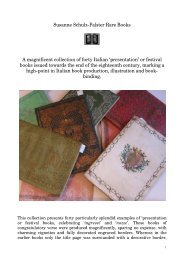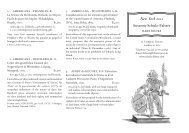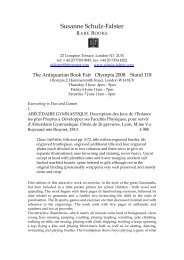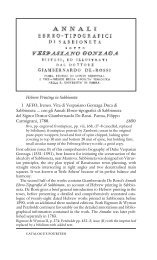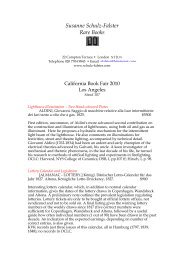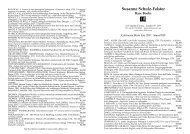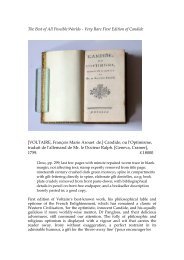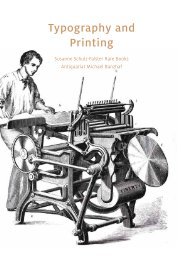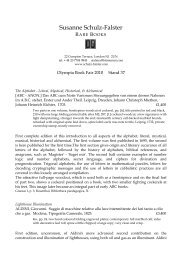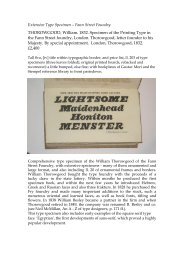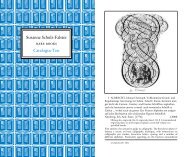Catalogue Number 7 - Susanne Schulz-Falster
Catalogue Number 7 - Susanne Schulz-Falster
Catalogue Number 7 - Susanne Schulz-Falster
You also want an ePaper? Increase the reach of your titles
YUMPU automatically turns print PDFs into web optimized ePapers that Google loves.
lettering to upper board; a Wne, entirely unsophisticated copy, with<br />
some contemporary underlining in ink.<br />
First edition, very rare, of the Wrst printed statutes of the guild of blacksmiths<br />
and metalworkers of Bologna, and in fact one of the earliest printed guild<br />
statutes. They give a detailed picture of the organisational structure of this<br />
guild, which played a major role in the history of the city both economically<br />
and socially. Because of its responsibility for the production of armoury and<br />
weaponry in addition to welding and general metalwork, it held an elevated<br />
position in the city structure. In earlier times the guild had functioned as a<br />
bank, where guild members could borrow money as business loans. The<br />
corporation exerted a monopolistic inXuence over its members, and controlled<br />
the supply of coal according to rank and position within the corporation.<br />
The statutes give details of the hierarchy within the guild, eligibility for<br />
membership, appointment and function of oYcials, rules of fair trading, and<br />
details of internal jurisdiction.<br />
Tavoni’s study gives a detailed account of the numerous manuscript statutes<br />
which circulated from the mid-thirteenth century and which gradually<br />
evolved into the form in which we Wnd in these Wrst printed statutes of 1579.<br />
Manzoni II, 7; STC 116; for a detailed study see Tavoni, Maria G., Gli statuti della<br />
società dei Fabbri dal 1252 al 1579, 1974; NUC, RLIN and OCLC record just three<br />
copies, at the University of Pennsylvania, the National Sporting Library, and the<br />
International Institute of Social History.<br />
susanne schulz-falster rare books catalogue seven<br />
The Most Celebrated Law Book in the English Language<br />
7 BLACKSTONE, Sir William. Commentaries on the Laws of<br />
England. . . Oxford, printed at the Clarendon Press. 1768–69.<br />
£3500<br />
Four volumes, 4to, pp. [iv], iv, [iv], 485; [viii], 520, xix appendix;<br />
[viii], 455, xxvii appendix; [viii], 436, viii appendix, [39] index, with<br />
two engraved tables (one folding) to volume 2; some light, but even<br />
browning to paper; a Wne copy in contemporary green calf with red giltlettered<br />
spine labels; spines faded, and hinges weakening, but all<br />
holding Wrm.<br />
First editions of volumes three and four, third edition of volumes one and<br />
two. A most attractive set of Blackstone’s Commentaries on the Laws of England,<br />
the fundamental text in English law. Because the work was published<br />
over a period of Wve years, it is mostly found in mixed sets like this one.<br />
‘Until the Commentaries, the ordinary Englishman had viewed the law as<br />
a vast, unintelligible and unfriendly machine; nothing but trouble, even<br />
danger, was to be expected from contact with it. Blackstone’s great achievement<br />
was to popularise the law and the traditions which inXuenced its formation.<br />
. . If the English constitution survived the troubles of the next<br />
century, it was because the law had gained a new popular respect, and this<br />
was due in part too the enormous success of Blackstone’s work’ (PMM).<br />
Blackstone’s book exerted tremendous inXuence on the legal profession<br />
and on the teaching of law in England and in the United States. In trying to<br />
cover the whole of British law and present it logically, Blackstone divided<br />
the law into four volumes and themes. Book I covered the Rights of Persons,<br />
a sweeping examination of British government, the clergy, the royal<br />
family, marriage, children, corporations and the ‘absolute rights of individuals’.<br />
Book II, on the Rights of Things, should more properly have been<br />
called the Rights that people have in Things. It begins with the observation<br />
that ‘There is nothing which so generally strikes the imagination and engages<br />
the aVections of mankind, as the right of property’. In hundreds of<br />
pages of arcane analysis he then disproves the point. Book III covers Private<br />
Wrongs, today known as torts. Book IV covers Public Wrongs: crimes and<br />
punishment, including oVences against God and religion.<br />
See Printing and the Mind of Man 212.<br />
Exploitation of Colonial Resources<br />
8 [BOLTS, William.] Stato Civile Politico, e Commerciante del<br />
Regno di Bengala ovvero Storia delle Conquiste e<br />
dell’Amministrazione della Compagnia Inglese in quelle Contrade.<br />
Opera Divisa in due Tomi. Che vengono a formare i Tomi XIX e XX<br />
in seguito della Storia FilosoWca, e Politica dell’Abate Rainal. Tome<br />
Primo [–Tomo Secondo], 1780. £680



